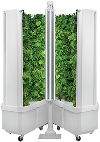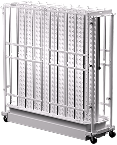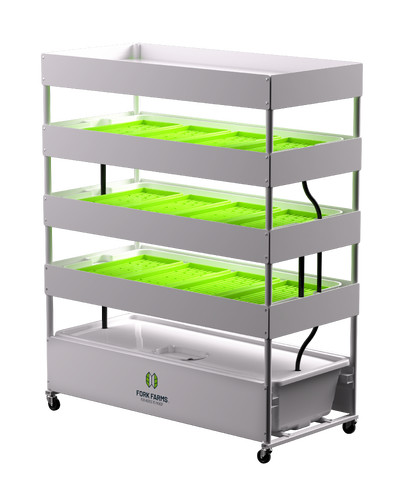4 Myths About Hydroponic Growing Systems: Busted
For anyone interested in trying hydroponics but still acquiring knowledge about the process, it can be challenging to discern fiction from fact. Like any growth method, there are a lot of opinions and misconceptions about its effectiveness, specifically regarding nutrition, taste, complexity, and environmental impact. In this article, we’ll review common beliefs about hydroponics and guidance on benefiting from the advantages.
Myth: Hydroponic Plants Lack Nutritional Value
Fresh fruit and vegetables are a nutritious and vital addition to any diet and the backbone of most food systems. So, when investing in hydroponic growing systems for the first time, many have questions about the nutritional value of hydroponically grown crops. Is it the same as traditional growing methods?
The key to the success of the hydroponic systems industry is that they deliver precisely controlled nutrients to plants. Crops receive more accurate amounts of what they need to grow fully and effectively through this technique. This allows farmers to decrease plant waste and get better crops without depleting vital resources.
Myth: Hydroponically Grown Produce Tastes Different
A common misconception about hydroponically grown produce is that the taste is inferior or different. In truth, the taste of produce isn’t based on the cultivation method but on the plant variety. Hydroponic plants are full of important nutrients and taste the same as food grown from traditional methods. The nutrition of hydroponically grown produce can be so good that countries like Jamaica are implementing hydroponics production to help solve issues within their food production systems.
Myth: Hydroponics is Complicated and Expensive
With so many ways communities can utilize hydroponic growing systems, various systems are on the market to match different budgets, user experience levels, and aspirations. And while the technology may seem intimidating, there are many user-friendly options available, like the Flex Farm.
These systems allow growers, ranging from beginner to more advanced, to grow plants and crops in compact spaces and ambitious farmers to maximize crop yield and increase profit.
These systems' simplicity, versatility, and cost-effectiveness allow suburban and urban growers to cultivate, process, and distribute their agricultural output without exceeding their budgets.
Myth: Hydroponic Farming is Not Environmentally Friendly
In the next thirty years, the landscape of our environment will be vastly different, with an estimated 50 percent increase in urban water usage. When anticipating these changes, it’s essential to find eco-friendly growth solutions. As a sustainable growing method, hydroponic farming allows farmers and aspiring growers to expertly balance light, temperature, water, nutrients, and airflow, preserving essential resources and using less pesticides. This enables farmers and growers to ensure faster, higher, and more space-efficient crop production from anywhere in the world.
Benefits of Hydroponic Farming
With the growth of the hydroponic farming industry comes many benefits.
- Increasing Crop Yields - Hydroponic systems help farmers optimize growth conditions, leading to higher yields than traditional soil methods. These systems allow growers to control and manage essential growth elements, including temperature, humidity, lighting, and oxygen. When done effectively, this can impact the quality of plants and increase crop growth rate.
- Water Conservation - The recirculation systems of hydroponic growing technology allow farmers to significantly reduce their water usage, resulting in as much as ten times less water than traditional growing methods. Additionally, the method provides nutrients to crops in a way that prevents run-off to the environment, vital for conserving resources.
- Year-Round Cultivation - Hydroponics allows growers to control climate indoors, enabling year-round cultivation regardless of external weather conditions. For example, areas with cold or arid climates can extend their growing season, producing and increasing the amount of high-quality crops.
- Space Efficiency - The compact nature of some hydroponic systems, many of which are portable or vertical, makes them ideal for urban gardening and limited spaces.
Why Fork Farms: Your Trusted Partner in Hydroponics
Fork Farms' user-friendly hydroponic growing systems are designed for anyone, offering everyone, from aspiring farmers to teachers, the ability to grow nutritious vegetables, herbs, and fruit without using soil.
Example: Concord High School in Michigan
Students at Concord High School in Michigan use Flex Farms, indoor vertical hydroponic farms, to grow fresh food year-round for teachers and other students. In their first year using hydroponic farms, students grow lettuce, adding strawberries, tomatoes, and cucumbers in year two. Alan Breneman, Concord's Director of Food Services, explained that the school will use the students-grown food for lunches throughout Concord's cafeterias.
“(Students) are going to have sweat equity in what they grow because they’re going to see it on their trays at lunch,” Breneman said. “It’ll be a good skill-building opportunity for them to see how easy it is.”
Concord schools will maintain four Flex Farms that can grow 25 pounds of lettuce each month. Given the compact and soil-free nature of the units, each farm equates to about 500 square feet of growing space. This equates to a 2,000-square-foot garden in a nine-by-nine square-foot area.
Example: Sherman Park Grocery and Cultivate Partnership
Cultivate, led by Jason Mims, allows high school students to grow plants in hydroponic system, Flex Farms, harvest them, and prepare them for purchase. The farm yields diverse produce that is high in quality and taste and is an economical choice for the students that also benefits the community.
This farm, located in the heart of Milwaukee in the Sherman Park neighborhood, features rows of hydroponic systems growing everything from mint to red butter lettuce. Cultivate connects food security, community, and employment for a primarily Black neighborhood that has been long underserved. The UnitedHealthcare Community Plan of Wisconsin supports this work – and these summer students – through an $80,000 grant to further the mission.
Going Further with Fork Farms
Fork Farms' commitment to sustainable agriculture has earned us accolades, such as being named on the Inc. 5000 list. As one of the top 25% of fastest-growing private companies in America this year, the #1 fastest-growing company in Agriculture and Natural Resources, and the #10 fastest-growing company in our home state of Wisconsin, Fork Farms continues to provide exceptional customer support and educational resources. Initiatives such as Farmative, our digital space where we provide collaborative tools to our customers, ensure that aspiring growers have ongoing assistance throughout their hydroponic journey.
Getting Started with Hydroponic Growing Systems
Don’t let the myths intimidate you! With the proper guidance and community, everyone can be educated and empowered to grow fresh food and create sustainable change. Fork Farms is one of many partners prepared to assist you with the right hydroponic growing system.
Explore our success stories to learn how to use hydroponics today!
Important Links:
























